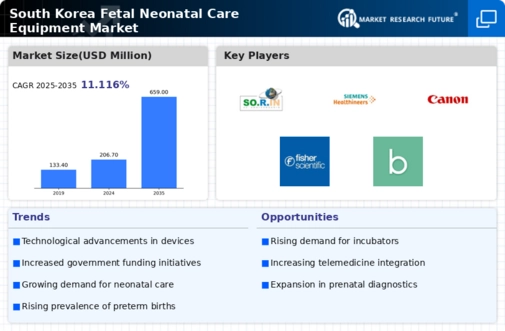Rising Birth Rates
The fetal neonatal-care-equipment market in South Korea is growing due to rising birth rates. Recent statistics indicate that the birth rate has shown a slight increase, which directly correlates with the demand for neonatal care equipment. As more infants are born, healthcare facilities are compelled to invest in advanced equipment to ensure the health and safety of newborns. This trend is particularly evident in urban areas where hospitals are expanding their neonatal units. The increasing number of births necessitates a corresponding rise in the availability of specialized equipment. Furthermore, the government has been supportive of initiatives aimed at improving maternal and infant health, which further enhances the market landscape. Consequently, the rising birth rates are a significant driver for the fetal neonatal-care-equipment market in South Korea.
Growing Health Awareness
Growing health awareness among the population is significantly influencing the fetal neonatal-care-equipment market. As South Koreans become more informed about maternal and infant health, there is a rising demand for high-quality neonatal care. Parents are increasingly seeking advanced medical solutions to ensure the well-being of their newborns, which drives healthcare providers to invest in better equipment. This trend is reflected in the increasing participation in prenatal education programs and health workshops, which emphasize the importance of proper neonatal care. Consequently, healthcare facilities are responding to this demand by upgrading their equipment and services. The heightened awareness surrounding neonatal health is likely to continue shaping the market dynamics, fostering a more robust fetal neonatal-care-equipment market.
Technological Innovations
Technological innovations play a crucial role in shaping the fetal neonatal-care-equipment market. The introduction of advanced monitoring systems, such as non-invasive fetal monitors and high-resolution imaging technologies, has revolutionized neonatal care. These innovations not only improve the accuracy of diagnostics but also enhance the overall efficiency of healthcare delivery. For instance, the integration of artificial intelligence in monitoring equipment allows for real-time data analysis, which can lead to timely interventions. As hospitals and clinics in South Korea increasingly adopt these technologies, the demand for state-of-the-art fetal neonatal-care equipment is expected to rise. This trend indicates a shift towards more sophisticated healthcare solutions, which is likely to propel the market further. The continuous evolution of technology in this sector suggests a promising future for the fetal neonatal-care-equipment market.
Increase in Premature Births
The increase in premature births is a critical driver for the fetal neonatal-care-equipment market. In South Korea, the incidence of preterm births has been on the rise, necessitating specialized care and equipment to support these vulnerable infants. Premature babies often require advanced medical interventions, including incubators, respiratory support, and monitoring devices. As the number of premature births increases, healthcare facilities are compelled to enhance their neonatal care capabilities. This trend not only drives demand for specific types of equipment but also encourages innovation in neonatal care technologies. The growing prevalence of premature births highlights the urgent need for effective solutions, thereby propelling the fetal neonatal-care-equipment market forward. The focus on improving outcomes for preterm infants is likely to remain a significant factor influencing market growth.
Government Funding and Support
Government funding and support are pivotal in driving the fetal neonatal-care-equipment market. In South Korea, the government has allocated substantial resources to enhance maternal and child health services. This includes financial assistance for hospitals to upgrade their neonatal care facilities and acquire modern equipment. Recent initiatives have focused on improving healthcare infrastructure, which directly impacts the availability of advanced fetal neonatal-care equipment. The government's commitment to reducing infant mortality rates and improving health outcomes for newborns has led to increased investments in this sector. As a result, healthcare providers are more likely to invest in high-quality equipment, thereby stimulating market growth. The ongoing support from the government indicates a favorable environment for the fetal neonatal-care-equipment market.
















Leave a Comment